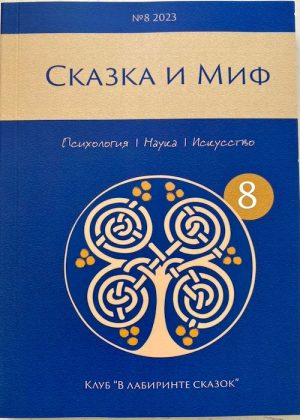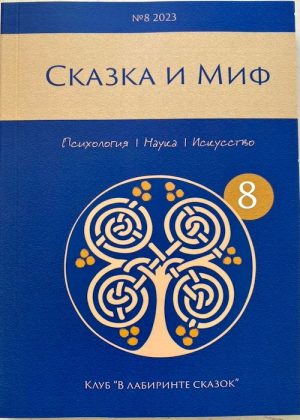My Store
Fairy Tale and Myth #8
Fairy Tale and Myth #8
Couldn't load pickup availability
In Russia, you can buy this magazine in the online store of the publishing house "Fairy Tale and Myth ".
In this issue:
From the editors
PSYCHOLOGY
9 The Silence of "God"
Bernard Sartorius's article, translated by Evgenia Frolova
25 Why return water to the Yellow River?
Christa Robinson's report, translated by Boris Gavrilov, Gulnaz Gulmanova, and Oscar Bakharkin
44 On the transcendent function in fairy tales: damage, absorption, hostility and trauma Article by Maria Semkova
SCIENCE
67 The image of the troll in Scandinavian folklore and literature
Article by Natalia Budur
Everything that is mythological is emotional. And vice versa. Almost everything that is emotional will be mythological. Interview with Yulia Pustynnikova and Alexandra Barkova. Part I
116 The Enchanting Sounds of Orpheus's Severed Head. Individuation and Ethnic Identity. The Development of Analytical Psychology in Russia
Article by Svetlana Savkina
ART
148 Dante's Divine Comedy: The Mandala of Awakening
Article by Claudio Maddaloni translated by Marina Lev
181 Artistic embodiment of the archetypal image of Anima in stories about mermaids. Based on K. Petsold's film "Undine"
Article by Margarita Leonova
193 Living Things Article by Natalia Kiryushina
DOING
207 Necessary conditions for the return of a warrior
Edward Tick's article, translated by Natalia Pavlikova and Evgenia Ermakova
224 I don't write poetry to write poetry Poems by Oksana Chikina
230 Transformational game "Sandplay in the Looking Glass" as an entry point into the rabbit hole Article by Elena Moskvina
239 Annotations
247 Abstracts
From the editors
Dear readers!
Starting with this issue, the magazine's numbering will change; it will no longer be double, but simply a sequential number, and that's it. So, what you're looking at now is Sim #8 2023—the eighth issue of the magazine, published in 2023. We hope Sim #9 will be published in the fall. The color of the issues will remain the same: odd numbers are light, even numbers are
- dark. This is the dan yang (light) and yin (dark). Previously, we had two issues per year: spring – a light issue, autumn – a dark one, thus creating a coherent year. But in 2022, we got confused and only produced one issue, which was published in January 2023. Now the second issue of 2023 is coming out, and
We hope to publish a third issue in the fall. Most likely, one issue will be published in 2024, and in 2025 we might return to two issues per year, but these are plans; no one knows what the reality will be.
We've managed to maintain a balance in this issue—four sections with three articles each. Let's talk a little about what we're bringing to your attention this time.
Traditionally, the "Psychology" section begins with Bernard Sartorius's article "The Silence of God," translated by Evgenia Frolova. This isn't a new text by Bernard; it was first presented as a lecture several years ago. For a long time, the translation was available on the "In the Labyrinth of Fairy Tales" club website, and we've now included it in our journal. We believe this is a very important and timely text, allowing us to discover ourselves in silence. God's silence doesn't mean his absence, but do we know how to be in unresponsive silence? Do we know how to be silent?
in each other's presence? The conversation about discovering and remembering oneself and one's roots is continued by Krista Robinson, in her article "Why Return Water to the Yellow River?" translated by Boris Gavrilov, Gulnaz Gulmanova, and Oskar Bakharkin, also based on a talk given at one
From conferences in China. Krista writes about connecting East and West, and about working with one of the most ancient modern oracles, the I Ching. And the third article in the section "On the Transcendent Function in Fairy Tales: Damage, Absorption, Hostility, and Trauma" by Maria Semkova, about the complexity of connecting opposites, the tension between oppositions, and the fear of absorption.
The second section of our magazine, "Science," opens with Natalia Budur's article, "The Image of the Troll in Scandinavian Folklore and Literature," about the evolution of the troll image from ancient texts to the modern internet. We then invite you to read the first part of a conversation between Alexandra Barkova and Yulia Pustynnikova about experiencing the mythological, the creation and discovery of mythology today, paganism, neopaganism, and modernity. This conversation took place in 2018; much has changed, but the topics discussed remain relevant today. You can read the second part of the interview.
You can read about this in the next issue of Sim. The final text in this section is Svetlana Savkina's article "The Enchanting Sounds of the Songs of Orpheus's Severed Head," which compares the ideas of C. G. Jung and A. F. Losev. The article is philosophical in nature and continues reflections on mythology.
The third section, as usual, is "Art." With Margarita Leonova, you'll descend to the bottom of the sea and see mermaids in the everyday world, analyzing the twists and turns of the film "Undine." Natalia Kiryushina, as always, invites you to the territory of Japanese kaidans; this time, you'll encounter living objects and perhaps even sense hints of Japanese culture. Claudio Maddaloni will continue the conversation; his article, translated by Marina Lev, "Dante's Divine Comedy: Mandala of Awakening," intricately intertwines Dante's text, alchemy, and yoga. This work will smoothly lead you into the fourth
section of the magazine "Doing".
Here you'll meet Edward Tick, who talks about caring for all people affected by war and how to conduct a retreat for them that can help them return. Tick's article, "Necessary Conditions for a Warrior's Return," was translated by Natalia Pavlikova and Evgenia Ermakova. Oksana Chikina, in her extraordinary text, "I Don't Write Poetry for the Sake of Writing Poetry," shares her experience of interaction, dance, and encounters with the Great Goddesses. And our issue concludes with Elena Moskvina's text, "The Transformational Game 'Sandplay in the Looking Glass' as a Point
entrance to the rabbit hole."
This is the path we offer you this time – from the silence of God to transformation through falling down the rabbit hole.
With the hope that reading will be not only pleasant, but also useful.
Sincerely,
Olga Kondratova, Yulia Pustynnikova,
Alla Tretyakova, Evgenia Frolova,
Elena Senkina
When placing your order, please note that shipping is calculated by weight. This book weighs 0.45 kg. We charge slightly more for the books to account for the packaging.
Share

